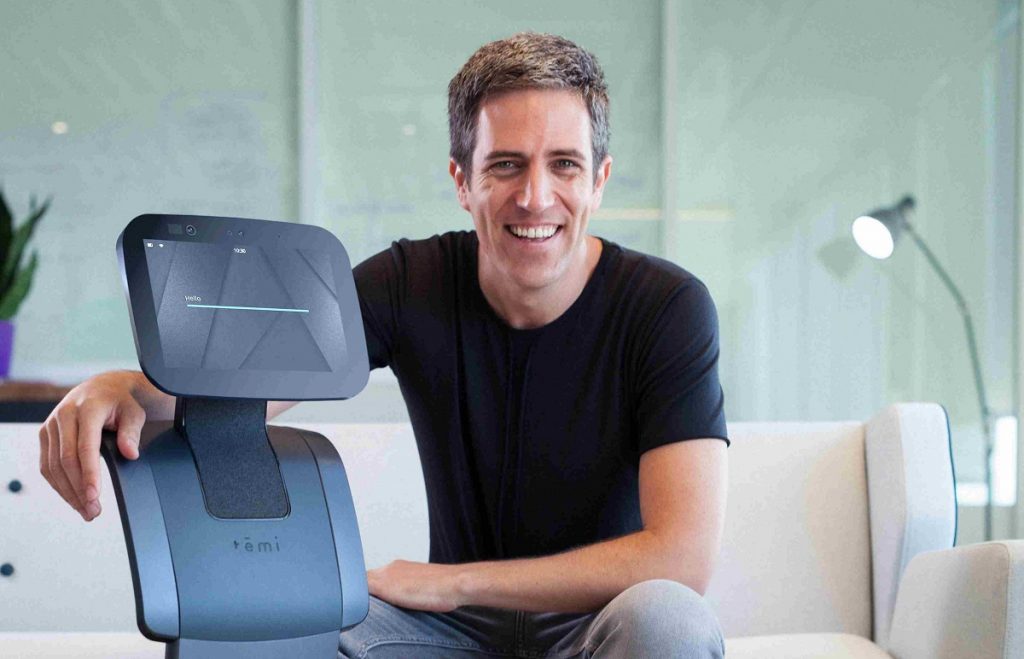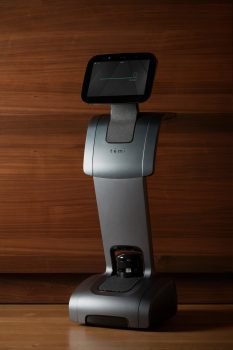If you’ve ever asked Alexa to (please) bring you a beer and got turned down by the voice assistant, the odds are looking good for soon being served after all. Temi, the first personal, AI-powered robot assistant developed by Israeli entrepreneurs, is collaborating with Amazon to get Alexa rolling – literally.
Temi Global is headquartered in New York City, with an R&D lab in Tel Aviv, and a business and manufacturing site in Shenzen, China. The company officially launched the Temi, or Robotemi, earlier this month at CES 2019 in Las Vegas, just weeks after raising a $21 million funding round led by existing investor John Wu, Generali Investments S.p.A. of Italy and the Hong Kong-based IoT and premium wellness giant Ogawa. The financing round brought Temi Global’s the total amount raised since its founding in 2015 to $82 million.
In Las Vegas this month, the company announced its newest collaboration with tech and retail giant Amazon, which CEO Yossi Wolf called “a major step up for Temi.” As part of the partnership, Temi Global will integrate Amazon’s Alexa and Echo Show functions into the machine, which it hails as the world’s first intelligent, mobile, personal AI-powered robot.
The product taps into the big trend of smart-display assistants, but differs from others by being mobile, featuring human-robot interaction characteristics and moving autonomously, the company says. Users can control Temi from any remote location in the world via the app and command different actions, from greeting guests at a hotel or restaurant to providing elderly medical assistance.
The soon-to-be rolled out solution – with the Alexa Smart Screen and TV Device SDK – “will enrich Temi with numerous skills, the world’s best natural language processing engine and more, which will take Temi to a new level of interactivity, usability, and familiarity,” says Wolf.
Robots of the future
Integrated virtual assistants was a huge trend at CES this year, where rivals Amazon and Google competed for attention. And, according to a report in The Verge, Temi will be among 150 products with Alexa built-in, as Amazon vies for the lead in virtual assistants. Ahead of CES, Amazon’s SVP of devices and services Dave Limp told The Verge that more than 100 million Alexa-enabled gadgets have been sold.
Personal robots such as Temi, short for “technology for me,” are taking things a step further and setting the stage for a whole new generation of smart assistants. The four-wheeled, 3-foot-tall device with a touch screen-face moves autonomously and connects people with friends, family and smart devices. Through Human-Robot interaction technology, Temi recognizes objects and faces, enabling it to self-navigate and even follow users around the house or office. It is either controlled from afar through an app or by direct voice command.

The ‘Temi’ robot with founder Yossi Wolf. Courtesy
“Interacting with the robot by voice, which was not possible at all until a few years ago, is the first piece of Temi’s value proposition”, Wolf tells NoCamels. But for him, two other products of the upcoming AI-revolution were important for completing the puzzle of personal robotics: high-quality video, and autonomous navigation.
“It is kind of trivial, but movement is a big game changer”, says Wolf. “Today, when you make a video call, you have to hold your phone, which is pretty limited. We believe that hands-free video calls will be the future and the ultimate way to spend time together.”
Busy families are among the target users of the robot company. Through Temi, family members who work or live far away from their relatives can be “present” at home at any time. “Instead of calling someone, I am calling somewhere. Although I am in a different place, I am in full control. If I tell Temi to look for my son, it will take me there and I can just be there and spend time with him. This is the basis,” Wolf explains.
By moving autonomously to desired locations, the robot allows people to be in two places at once, without being dependent on someone else to carry a mobile device. “As a personal robot, Temi connects the physical with the virtual world”, says Wolf. “It is the closest thing to face-to-face.”
According to Wolf, the robot is also gaining attention in the B2B (business-to-business) sector, with potential uses on sites such as retail stores, law firms or hotel chains. Temi can welcome customers or visitors, accompany them to designated locations and become a point of service and interaction, the company says.
“This is why the idea of having an open platform is very helpful for many developers. They can modify Temi for their needs: If a hotel chain would like to have automatic check-in, they can do it easily,” Wolf indicates.
With an earlier soft launch, online pre-sales had started in October 2018. Without disclosing concrete numbers, Wolf tells NoCamels that the current demand is already exceeding the company’s expectations. “We are moving very fast. Now we’re in the thousands, selling more than one robot every hour.”
He says that early adopters such as enthusiastic engineers and tech entrepreneurs make up most of the first customers. By March, the first significant charge of robots is expected to be delivered.
The achievement is significant but the road has been bumpy. “When you think about it, people have envisioned robots for many years. Now the issue with robotics is not the idea, but how to deliver”, Wolf says. “The biggest challenge – no question – was the user experience. Robots are designed for the human, but there is not even one company in the history of technology that has succeeded in nailing the user experience for home robotics.”
Sign up for our free weekly newsletter
SubscribeMilitary robotics to elder care
Temi is a spin-off of Robo-Team, a company for military robotics that Wolf and Elad Levy founded in 2009. “We decided to put all of our savings into this business – with a very simple belief that robotics will be the next wave of the internet”, recalls Wolf, who has a background in the Israeli Air Force special forces. With about 15 years of robotics experience, he describes Temi as “the holy grail” of his career.
It was initially envisioned for elderly care, with Wolf drawing direct inspiration from his grandmother whom he noticed had difficulty getting around. He believed a mobile robot would be greatly beneficial.
Today, elderly care is among Temi’s many functions. Not only does the robot call doctors in an emergency, it also serves as a walking device and has a small tray with which to transport objects. “Temi can be with you from the age of four to 120 because it has a clear design that is simple to use. This was the most important thing.”
Today, Temi employs 120 people across the world.
“I envisioned Temi already ten years ago, but only in the last four years we have been working really hard to develop it,” Wolf says. “It is the first personal robot – there is no reference – and this is why it was so challenging.”
But there are signs that Temi may not stay one of its kind for a very long time. Amazon has already revealed plans to release a home robot called Vesta (after the Roman goddess of the hearth, home, and family) by the end of 2019.
And Samsung gave a glimpse of its Samsung Bot Care at CES 2019, a new health care assistant designed for elderly patients and others in need of at-home medical care assistance. The robot “specializes in helping user(s) manage their daily health routine… and is capable of measuring users’ blood pressure, heart rate, breathing and more, and can alert users when they need to take their medicine,” Samsung said.
When asked what this competition would mean for Temi, Wolf stays relaxed. “Well, we will just close the company”, he jokes.
But really, Wolf thinks “this is the best news of the year for robotics.”
“If it’s a great product, other companies like Google and Facebook will enter the market as well and look for good partners.” Mentioning that Temi is already collaborating with some “big boys”, Wolf presents himself open for such options.
“I assume that there will be a delay with Amazon’s robot. But in any case, it will [mean] great things for personal robotics because it will push everybody. The market is endless, so it will be very interesting to see what the big companies will do following Amazon. I can tell you that in the last few months all of the big guys – Microsoft, Amazon, and Google – [launched] new cloud services for robotics. So while everyone is trying to get into this business, we are just trying to move forward fast and to be the first with our product.”
Temi is available for sale at $1,499 online, and in a dozen stores across the US. According to Wolf, the company is going to expand to European and Asian locations like Japan “in a very short time”.
Temi’s recent $21 million funding round included a plan to set up better marketing and distribution, with the aim of making Temi available in 180,000 points of sale worldwide.
“It’s a new product and it’s not cheap”, says Wolf. “People would like to see a demo to better understand its value. So we believe combining online and offline is much cleverer.”
Related posts

Editors’ & Readers’ Choice: 10 Favorite NoCamels Articles

Forward Facing: What Does The Future Hold For Israeli High-Tech?

Impact Innovation: Israeli Startups That Could Shape Our Future





Facebook comments